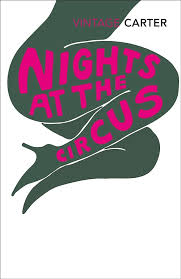
Angel Carter’s Nights at the Circus explodes on the page in the form of six-foot-two, eyes of blue, fourteen stone Fevvers, a feminist icon, who has wings and really can fly. Or so it seems, she’s an aerialiste that needs no high wire. The high-flying star of Colonel Kearney’s circus—a fool and his money are easily parted; never give a mug a break—courted by Royalty, The Prince of Wales, painted by Toulouse Lautrec. She’s the toast of Paris, of Berlin, of Europe. Her tour will take her from smoke-filled London of 1899 to the beginning of a new century, and to dazzle St Petersburg and onto the cold wastes of Siberia.
Magical Realism hadn’t been invented. American reporter Jack Walser finds himself trapped in her London dressing room after another wildly successful show. He plans to include her in a series of stories about the great humbugs of Europe, but the questions he asks isn’t the questions she answers. Her constant companion, Lizzie, is also an unsettling presence. He’s befuddled and intoxicated in more ways than he knows.
‘Lor’ love you sir! Fevvers sang out in a voice that clanged like dustbin lids. ‘As to my place of birth, why I first saw light of day in smoky old London, didn’t I! Not billed “the Cockney Venus”, for nothing sir, though they could just as well ‘ave called me “Helen of the High Wire”, due to the unusual circumstances in which I came ashore—for I never docked via what you might call normal channels, sir, oh, dear me, no, just like Helen of Troy was hatched.
Hatched out of a bloody great egg, while Bow Bells rang, as ever is.’
Angela Carter’s short-story, Lizzie’s Tiger, begins in a quieter way. ‘When the circus came to town, and Lizzie saw the tiger, they were living on Ferry Street, in a very poor way’.
Nights at the Circus has tigers and Princess and a strongman rapist but ever stronger women, who tend to stick together. After all, Fevvers (a nickname derived from the feathers that sprouted on her back) was raised in a brothel and then adopted. Lizzie breastfed her, but she had a multitude of mothers who were well aware of what men were like in close quarters.
Lizzie had to step down from her harlotry and become a housekeeper because she asked too many awkward questions as Angela Carter does of her readers. ‘What is your name?’ ‘Have you a soul?’ ‘Can you love?’
With subcategories that tend to be didactic. Attitudes to ‘white slave trade?’; ‘rights and wrongs of women?; ‘universal suffrage?’; ‘the Irish question?’; ‘the Indian question?’; ‘republicanism?’; ‘syndicalism?’; ‘abolition of the House of Lords?’.
‘Nothing can come from nothing?’ And the question that Othello dare not ask adds a learned Shakespearian tone to what is in essence a love story as Walser goes incognito and joins the circus as a clown and travel to St Petersburg to find out the real story about Fevvers.
Essence is a theme. ‘Singularity,’ where gravity become strong enough to bend spacetime, where physics breaks down, but this is what Lizzie urges her not-so-little Fevvers to avoid, to keep her essence, to keep her singularity and not become the property of a man, any man, including the clown Walser. To keep her wings. To keep her singularity so that she can be who she is and fly and be herself.
An explosion of colour and depth, with an emphatic understanding of what it means to be poor. (The rich tend to be villains.) Well worth reading. I haven’t captured the essence. I’ll be reading more of Angela Carter’s works.
- 😈 “Unleash the Beastie! https://bit.ly/bannkie
- 📚 Share the Magic, Share the Page! 🌟 #BeastieNovel #BookBuzz” 😈
